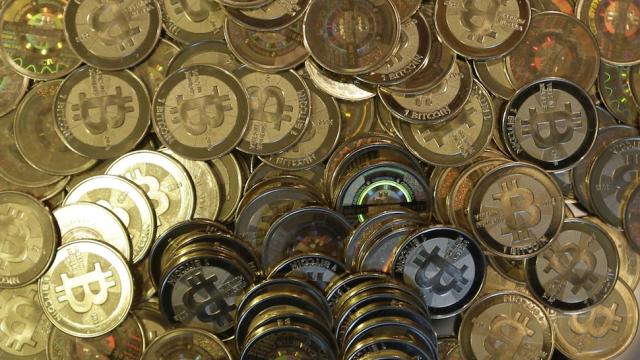Almost exactly two years ago, Wired published a feature about Bitcoin, comparing the cryptocurrency to “overhyped Silicon Valley IPOs”. The headline read, matter-of-factly, “The Rise and Fall of Bitcoin”. And, while the magazine was right about the rise, the fall is still to come.
In many ways, Bitcoin has never been stronger than it is right now. The value of a single Bitcoin is now hovering at a jaw-dropping $US400. You can even take out cash at a Bitcoin ATM. More and more businesses are accepting Bitcoin, and you can actually use Bitcoin to start a retirement account or make campaign donations. We even recently learned about a Norwegian man who invested $US27 in Bitcoin four years ago — and is a millionaire today.
But the jig is almost up. Foreign Policy just published a feature begging the question: “Can the skyrocketing cryptocurrency survive when all of D.C. is looking to tame it?” As the government turns its regulatory gaze in Bitcoin’s direction, and the exchange rate seems to spiral out of control, there is indeed a reckoning coming, and it’s coming from all sides. The only question now is what will hit first.
Washington
Next week, the Senate Committee on Homeland Security and Governmental Affairs is holding a hearing on the “potential risks, threats, and promises” of cryptocurrency, and the Senate banking committee plans to follow suit. This is real big-boy stuff for Bitcoin, which once just looked like a nerdy novelty. Up until now, one of the main selling points of the cryptocurrency is the extent to which it existed outside of government control, but, if the Senate does decide to get more involved, that honeymoon may soon be over.
Conforming to new regulatory standards costs money, money that the Bitcoin community (ironically) might not have. The government’s already hurled fines at exchanges like Mt. Gox for operating a money transmission business without filing the correct paperwork, and far more scrutiny is to come. With the creation of groups like the Digital Asset Transfer Authority (DATA), there’s clearly an effort by the denizens of Bitcoin investors and advocates to negotiate the regulatory terrain in Washington. But, inevitably, a bunch of senators who might not even understand how cryptocurrency works might cast the deciding vote.
Criminals
The fall of the online black market Silk Road sounded like a wake-up call for Bitcoin. While the utopian dream of an anonymous, unregulated currency made it possible to buy and sell pretty much anything in the world on Silk Road, the FBI’s seizure of the site proved that such blatant disregard for the law would not be tolerated. This left plenty of people wondering if the cryptocurrency itself shouldn’t be shut down, too. Regardless of the higher purpose of Bitcoin, the fact of the matter is that it makes it easy to operate illegal markets and to launder money.
Advocates are quick to point out that the criminal actions of a small group of users shouldn’t doom the future of Bitcoin as a whole. After all, criminals use dollars and euros to break the law all the time. But Bitcoin makes it substantially easier, and that scares the Feds. Back in March, the Treasury Department called for Bitcoin exchanges to register as money transmitters in order to prevent fraud and money laundering. And, if criminals using Bitcoin keep getting busted, you can count on Treasury to enforce this idea.
Bitcoin itself
So here’s the thing: Wired might be right in the end. Bitcoin’s going strong now — the value is soaring and awareness is spreading — but the cryptocurrency’s champions seem a little confused about what Bitcoin really is. This is how bubbles form, and it’s also how they pop. Foreign Policy explains it well:
If the exchanges aren’t interested in regulation, or can’t afford it, Bitcoin is going to have a hard time maturing into a widely used currency. Nicholas Colas, chief markets strategist with ConvergEx Group, estimates that the majority of Bitcoin buyers — as high as 90 per cent — are investors, rather than people who intend to use it as currency to buy and sell things. If a currency isn’t used, it has no value. It’s not like a stock or a bond that is connected to the value of a company.
This is all to say that Bitcoin still hasn’t gotten over its identity crisis. Is it legal tender and thus subject to all of the same laws and regulations as the good ol’ dollar? Is it an investment that should hold its own on Wall Street? Or, as naysays continue to insist, just an enabler of criminal enterprise? We’ll know soon enough. [FP, Wired, The Week]
